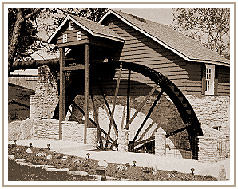Although I’m actually sitting in my studio with fingers on keyboard, I’m not really here at all. In my mind I’m running across the state-owned meadows of Kentucky School for the Deaf, under the patchy morning sunlight of late September. The characteristics of the season remind me of my high-school cross-country days, but soon I’m catapulted back in memory even more. For the countless time in my life, I breath in the fragrance of fresh-cut hay.
The smell of hay… I’m an elementary-schooler once again, playing with my friend David Silknetter in the barn at his family’s farm on Route 48, just north of the old water-wheel landmark. Remembering Silknetter is to relive the angst of accepting and defending his childish fantasies, and to make the painful choice between placing trust in a friend or in family. It is foolish to believe these early experiences fundamentally shape our character, but naive to think they do not have some kind of influence. For me it came at a crossroads of my sense of the “world out there.”
“Real life” outside the nuclear-family nest was intriguing in part because it seemed more than a bit dangerous, and David’s appeal was his smug disregard for the forbidden. Part of the lure of building bale forts in his barn loft was linked to the stories of kids suffocating when their improvised warren collapsed. Certainly the smell of hay was the last sensation of their brief, tragic lives. I could scoff at such hazards by trusting David’s construction skill and his brilliant idea of positioning the deepest chamber next to a supply of air and light—the largest knot-hole in the barn siding. My trust would be well placed. Or would it?
When I came to accept my family’s conviction that Silknetter lied to me about his secret machine that wrote down the name of anyone who discovered our hay-bale tunnel, it was clear I would never play with him again, and the exposure of his deception would mean that he had no choice but to mark me as his enemy. Hadn’t I betrayed his confidence? How much do these formative judgments affect our evolving sense of the external world, the nature of human relationships, the relative surmountability of life’s dilemmas, and the stability of “things as they are?” Yes, I understood that the pitfalls of life were realities unconnected to Whittlin’ Jake’s puppet shows, or the nightly Old-West perils of a television backlot. The messy business of choosing new friends and confronting the unknown was real, of course, and part of a world that appeared, to a developing degree, forebodingly unpredictable. Boyhood imagination about such things can be a rabid creature when infected by rumors and fragments of truth… Or unexpected developments—like the time John Herman threatened to beat me up if my brothers continued to laugh at him. And they continued to laugh at him. It was a known fact that the real world had its share of John Hermans, and that rural existence was filled with grim eventualities. The Iddings boy had two fingers and a thumb chewed off by a corn-picker mechanism. A local farmer, a family acquaintance, had accidentally killed his own son when the youngster fell off the back of his tractor and under a hay mower. I eavesdropped with astonishment when the older boys talked about how Elwood’s brother had ”half his head blown off” in a shotgun mishap.
During those years I probably reached a turning point of which I was not consciously aware. In other words, which perspective seemed more inviting to me—the hidden potential of taking on the outer world, or the possibilities of fashioning a plastic inner world? How did I prefer to risk my creativity? When mixed with the harsh moral instruction and institutional propaganda of the 1950s, is it surprising that I found less comfort in the mode of an extrovert? Is it difficult to understand why I chose internal family mythology over practical community engagement, Hollywood over literary realism, art over science, seat-of-the-pants intuition over sober accountability? Or, had my gears been calibrated and set in motion long before? Was I already imprinted by an invisible heritage to turn and grind a particular way? 